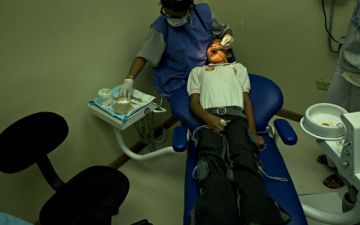A revolution challenging the underpinnings of American economic and political hegemony has emerged in Latin America. At its center sits the Bolivarian movement of Venezuela's President Hugo Chavez. Photographer Andrew Cutraro and reporter Guy Taylor explore socio-political realities on the ground to assess the basis of Chavez's appeal and the challenges he is yet to face. Leading up to Venezuela's Dec. 3 presidential election, Taylor and Cutraro looked under the skin of a cult of personality surrounding Chavez and his government's aggressive relationship with mass media in Venezuela. Women faint when they meet Chavez. Men create stampedes to keep up with his caravans through impoverished cities. His fans are wowed by what they call a rare, God-given charisma and genuine commitment to channeling Venezuela's vast oil revenues toward the poor.
But his critics say he's a global-media-savvy psychological warrior and rising socialist dictator. Taylor and Cutraro also examined structural changes to government being pushed by Chavez, including the recent formation of thousands of community councils. His backers say they put power at the grass-roots level and represent the revolution's future. Critics say the councils are bent on replacing capitalism and the existing municipal government with a counterproductive, chaotic system of cooperatives.

